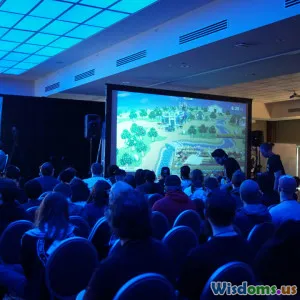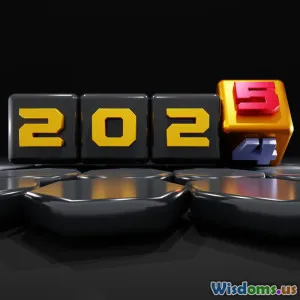
E3 Versus Gamescom Which Event Revealed More Blockbusters
9 min read An in-depth comparison of E3 and Gamescom, analyzing which event unveiled more blockbuster games in recent years. (0 Reviews)
E3 Versus Gamescom: Which Event Revealed More Blockbusters?
In the ever-evolving landscape of the video game industry, two events stand out as the epicenters of anticipation and hype for gamers and industry professionals alike: E3 (Electronic Entertainment Expo) and Gamescom. Each year, these mega-expos attract millions of gaming fans worldwide, eager to witness the unveiling of the latest and greatest games. But when it comes to revealing blockbuster titles—those high-budget, highly anticipated games that define our console generations—which event takes the crown? This article delves deep into the history, presentation styles, and notable announcements of E3 and Gamescom to provide an insightful answer.
Understanding the Giants: E3 and Gamescom
What is E3?
E3 has long been considered the flagship event in the gaming calendar. Established in 1995, it traditionally serves as a centralized platform where major publishers, hardware manufacturers, and developers convene to showcase upcoming releases and hardware. Its allure stems from a compact, media-friendly format often emphasizing spectacular announcements from industry titans such as Microsoft, Sony, and Nintendo.
What is Gamescom?
Grown into Europe’s largest gaming event since its inception in 2009, Gamescom attracts a vast public audience alongside industry professionals. Held in Cologne, Germany, it blends business-oriented presentations with fan-centric engagement, creating an electrifying atmosphere where new titles are not only announced but also playable for many attendees. As a result, it tends to showcase a diverse array of games including indie developers and mid-tier productions alongside some anticipated blockbusters.
Historical Blockbuster Reveals: Setting The Stage
Blockbusters at E3
Historically, E3 has dominated groundbreaking revelations. For instance, consider the 2013 unveiling of "The Last of Us" by Naughty Dog, which dramatically heightened expectations and excitement. Moreover, in 2019, during their E3 press conference, Microsoft revealed "Halo Infinite," the highly awaited sequel with a debut trailer that reignited enthusiasm for the franchise. Other monumental moments include "The Legend of Zelda: Breath of the Wild" at Nintendo’s 2016 E3 event, changed the landscape for open-world adventure games.
Blockbusters at Gamescom
Gamescom has hosted its fair share of impactful debuts too—though often somewhat overshadowed internationally by E3’s media blitz. The 2016 reveal of "Cyberpunk 2077" by CD Projekt Red during Gamescom was a seismic event, captivating millions. Additionally, the 2019 Gamescom featured the announcement and actual gameplay showcases for big titles like "Doom Eternal" and "Resident Evil 2" remake, differentiating it by allowing immediate player interaction.
Furthermore, Gamescom’s embrace of esports and indie games has created breakout stars such as "Among Us" and "Phasmophobia," albeit not traditional blockbusters by budget but impactful nonetheless.
Analyzing the Quality and Quantity of Reveals
Quantity
By sheer scale and the number of announcements, Gamescom often edges out E3, simply due to its mix of public access and extensive exhibitors. Gamescom hosts thousands of games, from major publishers to indie studios, resulting in a larger volume of overall reveals.
That said, volume is only part of the narrative. A greater number of reveals doesn’t mean more blockbuster games necessarily—many Gamescom announcements are smaller-scale or carry niche appeal.
Quality and Impact
E3’s tightly curated publisher-only platform historically guarantees that reveals focus on established franchises or anticipated new IPs, with substantial marketing resources behind them. This dynamic frequently leads to higher-impact blockbuster unveilings that shape industry trends and consumer expectations.
Experts affirm this viewpoint. For example, industry analyst Daniel Ahmad notes, "E3 remains the primary launchpad for AA and AAA titles due to its targeted media coverage and exclusive access, which builds sustained hype months ahead of release."
Gamescom, while growing in importance, sometimes struggles with overshadowing announcements because of the enormous number of games vying for attention. However, its unique strength lies in early access and demos, offering fans an unmatched hands-on preview that E3 typically lacks.
The 2020s: Changing Dynamics Amid Shifting Formats
Impact of the COVID-19 Pandemic
Both events had to adapt significantly to the COVID-19 pandemic, transitioning largely to digital showcases. In 2020, E3 was canceled entirely, while Gamescom pivoted to an online-only event named "Gamescom Now."
During these digital showcases, the lines blurred slightly. E3’s ever-present digital showcases adapted into several publisher streams, while Gamescom’s digital edition excelled in providing extensive developer interviews, gameplay demos, and community events.
Post-pandemic, both events are experimenting with hybrid models combining digital and live aspects. This evolution affects how blockbusters are revealed and marketed. The traditional physical media buzz has shifted toward global livestream accessibility, placing a premium on digital presentation skills and online engagement metrics.
Recent Blockbuster Highlights
- E3 2021: Featured the premiere of "Starfield" by Bethesda, a next-generation RPG with significant anticipation.
- Gamescom 2021: "Death Stranding: Director's Cut" made a major impression, together with new details on "Fable" by Playground Games.
These examples illustrate that blockbuster reveals now appear in multiple formats rather than exclusively to one event, signaling an increasingly distributed model for gaming announcements.
Fan and Industry Perspectives
Many gamers consider E3 the quintessential event for blockbuster reveals due to its concentrated press exposure and dramatic presentations. John Linneman of Digital Foundry remarked, "E3 cultivated the most iconic moments of the past two decades, setting the gold standard in industry presence."
In contrast, Gamescom's democratic and fan-focused approach earns it praise for visibility and inclusivity, often engaging audiences with playable demos, enriching community culture.
Conclusion: Which Event Revealed More Blockbusters?
The answer depends on defining "blockbuster." If considering impact, market-shaking reveal trailers, and exclusive media buzz, E3 historically leads, thanks to high-profile studio presentations, exclusivity, and WAS media-targeted. Without a doubt, titles like "The Legend of Zelda: Breath of the Wild," "Halo Infinite," and "The Last of Us" owe a significant part of their hype lifecycle to E3.
However, when focusing on accessibility, volume, and interactive experience, Gamescom offers a broader palette, revealing blockbusters in a more community-centric environment while embracing emerging trends and diversifying the scope of revealed titles.
Given the shifting landscape into digitally-driven reveals and hybrid formats, both festivals are redefining roles in the gaming ecosystem. The divide is less confrontational and more complementary, catering to different phases and audiences of the blockbuster reveal cycle.
Ultimately, enthusiasts will benefit from both events. For pure blockbuster spectacle and major global exclusive premieres, E3 is still the premier stage. For diversified game discovery and immersive early demos, Gamescom stands as an equally vital celebration.
References
- Analyst reports and statements from Daniel Ahmad.
- Historical event records from official E3 and Gamescom archives.
- Industry commentaries from Digital Foundry and IGN.
- Specific game reveal dates and reactions from Polygon and GameSpot.
Rate the Post
User Reviews
Popular Posts















